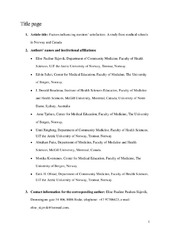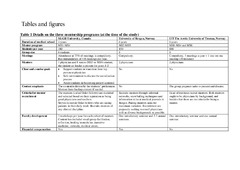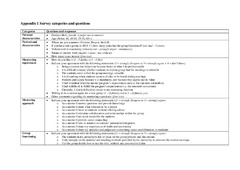| dc.contributor.advisor | Ofstad, Eirik H. | |
| dc.contributor.advisor | Ringberg, Unni | |
| dc.contributor.author | Skjevik, Elise Pauline | |
| dc.contributor.author | Schei, Edvin | |
| dc.contributor.author | Boudreau, J. Donald | |
| dc.contributor.author | Tjølsen, Arne | |
| dc.contributor.author | Ringberg, Unni | |
| dc.contributor.author | Fuks, Abraham | |
| dc.contributor.author | Kvernenes, Monika | |
| dc.contributor.author | Ofstad, Eirik H. | |
| dc.date.accessioned | 2022-11-01T12:26:00Z | |
| dc.date.available | 2022-11-01T12:26:00Z | |
| dc.date.issued | 2020-11-01 | |
| dc.description.abstract | <p><i>Phenomenon:</i> The mentoring of undergraduate medical students has been shown to benefit the mentors; however, detailed information on the factors that influence the satisfaction and motivation of mentors remains unclear. Such knowledge can be useful in sustaining group mentorship programs. The aim of this study was to investigate the experiences and perspectives of mentors to ascertain the factors that contribute to satisfaction and motivation.
<p><i>Approach:</i> As part of a larger research project, a survey was sent out to mentors at UiT the Arctic University of Norway, the University of Bergen and McGill University (N=461). Descriptive statistics, linear regression and factor analyses were used to examine the data in order to map factors associated with mentor satisfaction.
<p><i>Findings:</i> The overall response rate was 59% (n=272/461). Mentors reported a high mean satisfaction score of 4.55 (±0.04, median 5.00) on a five-point Likert scale. Six out of nine statements describing how mentors approach group mentoring were strongly correlated with each other. Through factor analysis of the items, we found a dominating factor labeled “Student-centered mentoring approach” which was strongly associated with the level of satisfaction as a mentor. Additionally, highly satisfied mentors took a greater interest in patient-centered medicine and their students’ personal development. Their groups spent more time discussing students’ clinical experiences, societal poverty and health, and patients’ suffering and sickness.
<p><i>Insights:</i> Our findings suggest that high mentor satisfaction, which is important for the pedagogical quality and sustainability of mentor programs, is related to the mentors’ student-centeredness and their interest in topics concerning professionalism. By preparing mentors for their roles and supporting them in developing strategies for establishing good mentoring relationships, the outcomes of group mentoring may be improved both for mentors and students. Interest in students’ personal development and the mentors’ own professional development seem to be indicators of mentors’ satisfaction and should be encouraged in mentorship programs. | en_US |
| dc.identifier.uri | https://hdl.handle.net/10037/27223 | |
| dc.language.iso | eng | en_US |
| dc.publisher | UiT Norges arktiske universitet | en_US |
| dc.publisher | UiT The Arctic University of Norway | en_US |
| dc.rights.accessRights | openAccess | en_US |
| dc.rights.holder | Copyright 2020 The Author(s) | |
| dc.rights.uri | https://creativecommons.org/licenses/by-nc-sa/4.0 | en_US |
| dc.rights | Attribution-NonCommercial-ShareAlike 4.0 International (CC BY-NC-SA 4.0) | en_US |
| dc.subject.courseID | MED-3910 | |
| dc.subject | Mentoring | en_US |
| dc.subject | Medical education | en_US |
| dc.title | Factors influencing mentors’ satisfaction: A study from medical schools in Norway and Canada | en_US |
| dc.type | Master thesis | en_US |
| dc.type | Mastergradsoppgave | en_US |


 English
English norsk
norsk


